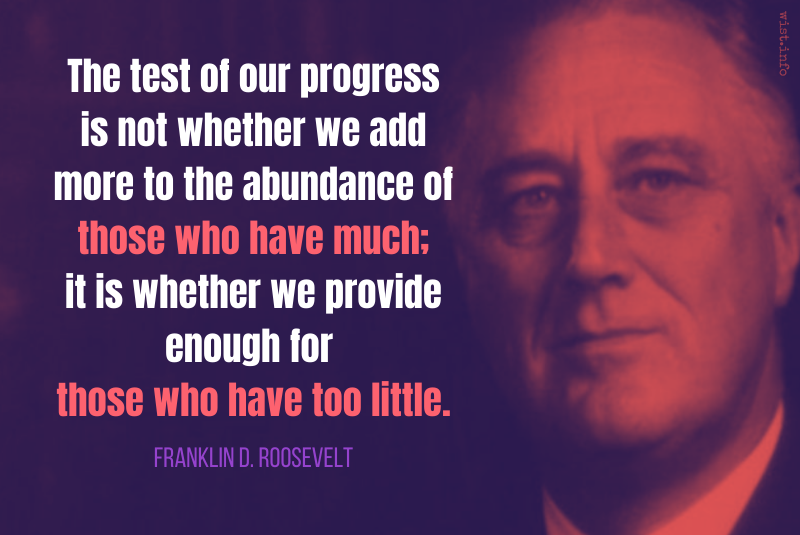Advanced cultures are usually sophisticated enough, or have been sophisticated enough at some point in their pasts, to realize that foxes shouldn’t be relied on to guard henhouses.
Jane Jacobs (1916-2006) American-Canadian journalist, author, urban theorist, activist
Dark Age Ahead, ch. 6 (2004)
(Source)
On business regulation, versus self-policing.
Quotations about:
profit
Note not all quotations have been tagged, so Search may find additional quotes on this topic.
No play is rubbish if it pleases and if it takes money at the door.
The least vile of all merchants is he who says: “Let us be virtuous, since, thus, we shall gain much more money than the fools who are dishonest.” For the merchant, even honesty is a financial speculation.
[Le moins infâme de tous les commerçants, c’est celui qui dit: Soyons vertueux pour gagner beaucoup plus d’argent que les sots qui sont vicieux. — Pour le commerçant, l’honnêteté elle-même est une spéculation de lucre.]
Charles Baudelaire (1821-1867) French poet, essayist, art critic
Journaux Intimes [Intimate Journals], “Mon cœur mis à nu [My Heart Laid Bare],” § 47 (1864–1867; pub. 1887) [tr. Isherwood (1930)]
(Source)
(Source (French)). Alternate translation:
The least despicable of merchants is the one who says: Let us be virtuous so that we can make far more money than those vice-ridden fools. -- For the merchant, even honesty offers a money-making opportunity.
[tr. Sieburth (2022)]
Printers are educated in the Belief, that when Men differ in Opinion, both Sides ought equally to have the Advantage of being heard by the Publick; and that when Truth and Error have fair Play, the former is always an overmatch for the latter: Hence they chearfully serve all contending Writers that pay them well, without regarding on which side they are of the Question in Dispute.
Benjamin Franklin (1706-1790) American statesman, scientist, philosopher, aphorist
“Apology for Printers,” Philadelphia Gazette (1731-06-10)
(Source)
Books aren’t just commodities; the profit motive is often in conflict with the aims of art. We live in capitalism, its power seems inescapable — but then, so did the divine right of kings. Any human power can be resisted and changed by human beings. Resistance and change often begin in art. Very often in our art, the art of words.
Ursula K. Le Guin (1929-2018) American writer
Speech, accepting the National Book Foundation Medal (19 Nov 2014)
(Source)
On receiving the National Book Foundation Medal for Distinguished Contribution to American Letters at the 65th National Book Awards. Video of the speech.
My views may seem to ignore a moral imperative that businesses should follow virtuous principles, whether or not it is most profitable for them to do so. Instead I prefer to recognize that, throughout human history, in all politically complex human societies in which people encounter other individuals with whom they have no ties of family or clan relationship, government regulation has arisen precisely because it was found to be necessary for the enforcement of moral principles. Invocation of moral principles is a necessary first step for eliciting virtuous behavior, but that alone is not a sufficient step.
Jared Diamond (b. 1937) American geographer, historian, ornithologist, author
Collapse: How Societies Choose to Fail or Succeed, “Big Businesses and the Environment” (2005)
(Source)
Few men, indeed, are so mad that they do not know when they are doing wrong. But so avid is their pursuit of goods that wrongdoing has become an element of all they do. To protest that fact is idle. Our politics, our business — little and big, our professions, our labor, are smitten in every facet with a corruption occasioned by reckless determination to make not just a reasonable profit but all the profit that can be wrung from every enterprise. Our commonest man, emulating his superiors, forges ahead with a brick on the safety valve of his conscience. Think over your morning paper in that light.
By virtue of exchange, one man’s prosperity is beneficial to all others.
Large banks are essentially large children in search of candy, except the candy is profits. The only thing preventing them from grabbing all the candy and making themselves sick are laws and regulations. We cannot rely on them to act morally. It’s not their nature.
Thornton McEnery (contemp.) American business journalist
“Jeffrey Epstein Should Be the Literal End of Deutshe Bank USA,” Above the Law (11 Jul 2019)
(Source)
As far as the advocacy of peace rests on material motives like economy and prosperity, it is the service of Mammon; and the bottom of the platform will drop out when Mammon thinks that war will pay better.
A. T. Mahan (1840-1914) American admiral, strategist, historian [Alfred Thayer Mahan]
(Attributed)
(Source)
Attributed in William Ralph Inge, "The Indictment against Christianity" (1917), Outspoken Essays, ch. 10 (1919).
During the greater part of the nineteenth century the significance of the opposition between the two principles of individual rights and social functions was masked by the doctrine of the inevitable harmony between private interests and public good. Competition, it was argued, was an effective substitute for honesty. Today … few now would profess adherence to the compound of economic optimism and moral bankruptcy which led a nineteenth century economist to say: “Greed is held in check by greed, and the desire for gain sets limits to itself.”
R. H. Tawney (1880-1962) English writer, economist, historian, social critic [Richard Henry Tawney]
The Acquisitive Century, ch. 3 “The Acquisitive Society” (1920)
(Source)
If conservatives get to call universal health care “socialized medicine,” then I get to call private, for-profit health care “soulless, vampire bastards making money off human pain.”
In our industrial and social system the interests of all men are so closely intertwined that in the immense majority of cases a straight-dealing man who by his efficiency, by his ingenuity and industry, benefits himself must also benefit others. Normally the man of great productive capacity who becomes rich by guiding the labor of other men does so by enabling them to produce more than they could produce without his guidance; and both he and they share in the benefit, which comes also to the public at large. The superficial fact that the sharing may be unequal must never blind us to the underlying fact that there is this sharing, and that the benefit comes in some degree to each man involved.
There is a crime here that goes beyond denunciation. There is a sorrow here that weeping cannot symbolize. There is a failure here that topples all our success. The fertile earth, the straight tree rows, the sturdy trunks, and the ripe fruit. And children dying of pellagra must die because a profit cannot be taken from an orange. And coroners must fill in the certificate — died of malnutrition — because the food must rot, must be forced to rot.
In the eyes of the people there is the failure; and in the eyes of the hungry there is a growing wrath. In the souls of the people the grapes of wrath are filling and growing heavy, growing heavy for the vintage.
When one sees the number and variety of institutions which exist for the purposes of education, and the vast throng of scholars and masters, one might fancy the human race to be very much concerned about truth and wisdom. But here, too, appearances are deceptive. The masters teach in order to gain money, and strive, not after wisdom, but the outward show and reputation of it; and the scholars learn, not for the sake of knowledge and insight, but to be able to chatter and give themselves airs.
[Wenn man die Vielen und Mannigfaltigen Anstalten zum Lehren und Lernen un das so große Gedränge von Schülern und Meistern sieht, könnte man glauben, daß es dem Menschengeschlechte gar sehr um Einsicht und Wahrheit zu thun sei. Aber auch hier trügt der Schein. Jene lehren, um Geld zu verdienen und streben nicht nach Weisheit, sondern nach dem Schein und Kredit derselben: und Diese lernen nicht, um Kenntniß und Einsicht zu erlangen; sondern um schwätzen zu können nd sich ein Ansehn zu geben Alle dreißig Jahre nämlich tritt so ein sondern um schwätzen zu können und sich ein Ansehn zu geben.]
Arthur Schopenhauer (1788-1860) German philosopher
Parerga and Paralipomena, Vol. 2, ch. 21 “On Learning and the Learned [Über Gelehrsamkeit und Gelehrte],” § 244 (1851) [tr. Saunders (1890)]
(Source)
(Source (German)). Alternate translation:
When we see the different institutions for teaching and learning and the vast throng of pupil and masters, we might imagine that the human race was very much bent on insight and truth; but here appearances are deceptive. The masters teach in order to earn money and aspire not to wisdom, but to the semblance and reputation thereof; the pupils learn not to acquire knowledge and insight, but to be able to talk and chat and to give themselves airs.
[tr. Payne (1974)]
Still, I do not mean to find fault with the accumulation of property, provided it hurts nobody, but unjust acquisition of it is always to be avoided.
[Nec vero rei familiaris amplificatio nemini nocens vituperanda est, sed fugienda semper iniuria est.]
Marcus Tullius Cicero (106-43 BC) Roman orator, statesman, philosopher
De Officiis [On Duties; On Moral Duty; The Offices], Book 1, ch. 8 (1.8) / sec. 25 (44 BC) [tr. Miller (1913)]
(Source)
(Source (Latin)). Alternate translations:
Not but that a moderate desire of riches, and bettering a man's estate, so long as it abstains from oppressing of others, is allowable enough; but a very great care ought always to be taken that we be not drawn to any injustice by it.
[tr. Cockman (1699)]
The enlargement of fortune is blameless, while no man suffers by its increase; but injury is forever to be avoided.
[tr. McCartney (1798)]
Nor indeed is the mere desire to improve one's private fortune, without injury to another, deserving of blame; but injustice must ever be avoided.
[tr. Edmonds (1865)]
Nor, indeed, is the increase of property, without harm to any one, to be blamed; but wrong-doing for the sake of gain is never to be tolerated.
[tr. Peabody (1883)]
Not that we have any fault to find with the innocent accumulation of property; it is the unjust acquisition of it of which we must beware.
[tr. Gardiner (1899)]
Of course, no one should criticize an increase in a family's estate that harms no one else, but it should never involve breaking the law.
[tr. Edinger (1974)]
We must honestly admit that capitalism has often left a gulf between superfluous wealth and abject poverty, has created conditions permitting necessities to be taken from the many to give luxuries to the few, and has encouraged small-hearted men to become cold and conscienceless so that, like Dives before Lazarus, they are unmoved by suffering, poverty-stricken humanity. The profit motive, when it is the sole basis of an economic system, encourages cutthroat competition and selfish ambition that inspire men to be more I-centered than thou-centered.
Martin Luther King, Jr. (1929-1968) American clergyman, civil rights leader, social activist, preacher
Where Do We Go from Here: Chaos or Community? (1967)
(Source)
Honour and profit lie not in one sacke.
George Herbert (1593-1633) Welsh priest, orator, poet.
Jacula Prudentum, or Outlandish Proverbs, Sentences, &c. (compiler), # 232 (1640 ed.)
(Source)
Failure: A man who has blundered but is not able to cash in on the experience.
Elbert Hubbard (1856-1915) American writer, businessman, philosopher
The Roycroft Dictionary (1914)
(Source)
He that will have the Kernel, must crack the Shell.
Thomas Fuller (1654-1734) English physician, preacher, aphorist, writer
Gnomologia: Adages and Proverbs, #2348 (1732)
(Source)
The test of our progress is not whether we add more to the abundance of those who have much; it is whether we provide enough for those who have too little.
Franklin Delano Roosevelt (1882-1945) American lawyer, politician, statesman, US President (1933-1945)
Inaugural Address (20 Jan 1937)
(Source)
The man of honor thinks of his character, the inferior man of his position. The man of honor desires justice, the inferior man favor.
[君子懷德、小人懷土、君子懷刑、小人懷惠。]
Confucius (c. 551- c. 479 BC) Chinese philosopher, sage, politician [孔夫子 (Kǒng Fūzǐ, K'ung Fu-tzu, K'ung Fu Tse), 孔子 (Kǒngzǐ, Chungni), 孔丘 (Kǒng Qiū, K'ung Ch'iu)]
The Analects [論語, 论语, Lúnyǔ], Book 4, verse 11 (4.11) (6th C. BC – AD 3rd C.) [tr. Soothill (1910)]
(Source)
(Source (Chinese)). Alternate translations:
The superior man thinks of virtue; the small man thinks of comfort. The superior man thinks of the sanctions of law; the small man thinks of favours which he may receive.
[tr. Legge (1861)]
The masterly man has an eye to virtue, the common man, to earthly things; the former has an eye to penalties (for error), the latter, to favour.
[tr. Jennings (1895)]
A wise man regards the moral worth of a man; a fool, only his position. A wise man expects justice; a fool expects favours.
[tr. Ku Hung-Ming (1898)]
The proper man is concerned with examining his consciousness and acting on it, the small man is concerned about land; the superior man about legality, the small man about favors.
[tr. Pound (1933)]
Where gentlemen set their hearts upon moral force (tê), the commoners set theirs upon the soil. Where gentlemen think only of punishments, the commoners think only of exceptions.
[tr. Waley (1938)]
The perfect gentleman cherishes high moral conduct; the mean man, well-being. The perfect gentleman cherishes the penal code; the mean man, ex¬ emptions therefrom.
[tr. Ware (1950)]
While the gentleman cherishes benign rule, the small man cherishes his native land. While the gentleman cherishes a respect for the law, the small man cherishes generous treatment.
[tr. Lau (1979)]
The gentleman cherishes virtue, but the small man cherishes the soil; the gentleman cherishes the rigors of the law, but the small man cherishes leniency.
[tr. Dawson (1993)]
A gentleman seeks virtue; a small man seeks land. A gentleman seeks justice; a small man seeks favors.
[tr. Leys (1997)]
The gentleman cherishes virtue; the small man cherishes land. The gentleman cherishes institutions; the small man cherishes favors.
[tr. Huang (1997)]
The gentlemen are concerned about the virtuousness; the mean persons are concerned about the land. The gentlemen are concerned about the status; the mean persons are concerned about the benefit.
[tr. Cai/Yu (1998), #77]
Exemplary persons (junzi) cherish their excellence; petty persons cherish their land. Exemplary persons cherish fairness; petty persons cherish the thought of gain.
[tr. Ames/Rosemont (1998)]
The gentleman likes virtue; the little man likes partiality. The gentleman likes justice; the little man likes mercy.
[tr. Brooks/Brooks (1998)]
while the noble-minded cherish integrity, little people cherish territory. And while the noble-minded cherish laws, little people cherish privilege.
[tr. Hinton (1998)]
The gentleman cherishes virtue, whereas the petty person cherishes physical possessions. The gentleman thinks about punishments, whereas the petty person thinks about exemptions.
[tr. Slingerland (2003)]
The gentleman has his mind fixed on virtue; the petty man has his mind fixed on land. The gentleman has his mind fixed on penalties; the petty man has his mind fixed on bounty.
[tr. Watson (2007)]
The gentleman [junzi] worries about the condition of his moral character, while the common man [xiaoren] worries about [whether he can hold on to] his land. The gentleman is conscious of [not breaking] the law, while the common man is conscious of what benefits he might reap [from the state].
[tr. Chin (2014)]
A Jun Zi cares about virtuous and righteous principles, whereas a Xiao Ren cares about worldly matters. A Jun Zi cares about rules and discipline, whereas a Xiao Ren cares about benefits.
[tr. Li (2020)]
The superior man seeks what is right; the inferior one, what is profitable.
[Source]
A wise man turns Chance into good Fortune.
Thomas Fuller (1654-1734) English physician, preacher, aphorist, writer
Gnomologia: Adages and Proverbs, # 475 (1732)
(Source)
Whenever people say “we mustn’t be sentimental,” you can take it they are about to do something cruel. And if they add, “we must be realistic,” they mean they are going to make money out of it.
Brigid Brophy (1929-1995) Anglo-Irish writer, novelist, playwright
Unlived Life
SON: Ill blows the wind that profits nobody.
William Shakespeare (1564-1616) English dramatist and poet
Henry VI, Part 3, Act 2, sc. 5, l. 55 (2.5.55) (1591)
(Source)





























